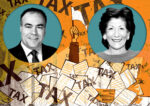
Kaegi says tax hikes in Latino, drops in Black areas reflect changing city
Assessor’s hit list: Kaegi reversing Chicago’s big commercial tax value cuts
Move shortens impact of winning appeals from big office, multifamily landlords as Board of Review battle enters new phase

Landlords of hundreds of downtown Chicago towers and commercial assets that won big breaks on their property tax bills last year found out their wins may be shorter lived than they’d hoped.
That’s because Cook County Assessor Fritz Kaegi is intensifying his battle with the Board of Review, betting its new makeup is friendlier to his vision of hiking commercial property taxes. Kaegi announced Thursday evening he will reinstate higher values on more than 500 large commercial properties in Chicago that had their tax values reduced by the Board of Review, thus saving their owners from paying more in taxes.
It’s a rare move for the assessor to reverse Board of Review reductions outside of the normal triennial reassessment process that has the city of Chicago reassessed on a three-year cycle, taking turns with the northern suburbs and the southern suburbs of Cook County.
In many cases, reductions granted by the Board of Review — a three-person elected body tasked with hearing appeals of assessed values from property owners who believe Kaegi’s office overestimated their real estate and want a break — stay in place until the next reassessment of the area in three years.
The move is likely to rattle landlords of large properties in the Loop.
They include Chase Tower at 10 South Dearborn Street and the Digital Realty Trust-owned data center at 350 East Cermak Road, which had the biggest discrepancies in the set between their 2021 values set by the Board of Review through an appeal and the initial assessed value from Kaegi’s office. The board shaved $79 million off of Chase Tower’s tax value to $73.9 million, and $67 million off the data center, a reduction by more than half of Kaegi’s initial value of $132 million. JPMorgan Chase was billed $14.9 million last year for Chase Tower taxes based on its value after the cut, less than half of what it would have been charged under Kaegi’s valuation.
“If your neighbor’s appeal is successful, it may reduce their bill, but it may cause everyone else’s bill to increase,” the assessor’s office said in a statement. “In the domain of Chicago property taxes, all neighborhoods are interconnected: assessments in the Loop affect tax bills throughout the entire city.”
Appealing for a tax cut is a common practice for large commercial building owners and a lucrative business for attorneys, especially last year. The board granted much larger reductions in 2022 than in the previous four years on commercial properties due to Kaegi having made large hikes of assessed values on the front end of the process in many cases.
The assessor’s office said reductions granted on the 559 properties where it’s reversing appeals comprised $2.7 billion of taxable value, or almost 3 percent of Chicago’s total tax base and drove up the city’s overall tax rate. While the appeals won’t impact what landlords owe for last year, they will have to go back to the Board of Review again this year to fight for another reduction instead of in 2025, if they want the lower tax bills to stay in place for the next two years.
Though the move will likely create more work for the Board of Review, newly elected board Commissioner Samatha Steele said she agrees that those properties should be given a second look.
“We do, as an office, need to ensure that the assessments are as accurate as possible,” she said. “As a neighbor, you’re picking up that burden and with billions of taxes not being collected because of these assessments, the community is losing out on valuable resources.”
Yet she’s also expressed concern with appeals being rehashed every year, creating more opportunities for attorneys to cash in on reductions granted by the board.
Not everyone agrees with Kaegi’s approach. A 2021 assessment ratio study from the Illinois Department of Revenue showed that commercial properties are over assessed in Cook County, Patrick Hynes, the assessor for suburban Lyons Township and a former Cook County Assessor’s Office employee, pointed out.
“I think the tentative versus final multiplier studies by the state are good evidence of the Board of Review’s competence and of Assessor Kaegi’s bias,” Hynes said in an email.
The statistics to which he referred show Kaegi’s assessments were outside the bounds of Cook County and Illinois law, he argued. Commercial owners could cite a provision in the state constitution that disallows assessments of the highest property class of a county from exceeding 2.5 times the level of the assessment of the lowest property class in that county as a legal argument, he said.
In Cook County, Kaegi’s assessments of residential property comprised 8.91 percent of the total tax value instead of the targeted 10 percent, while commercial and industrial clocked in, respectively, at 29.26 percent and 30.8 percent instead of the targeted 25 percent for both those asset classes, according to the state. Board of Review decisions on appeals brought commercial assets closer to the target, at 23.33 percent of the total tax value, while industrial assets moved closer, as well, to 25.76 percent, the state showed.
Kaegi’s office dismissed Hynes’ critique, noting that the study did not include the largest commercial transactions, which are often through real estate investment trusts and pension funds. “These are the types of properties included in this reset and explains why the IDOR study’s methodology, which measures assessments over a number of years and not a single year, does not accurately reflect whether our 2021 assessments are fair or not,” a spokeswoman for the assessor said in an email.
Board of Review officials also often point to their duty to defend the values left in place in Cook County following its reductions at the Illinois Property Tax Appeals Board, a state body whose members are appointed by the governor’s office that serves as a second route real estate owners can take to object to the values set by their respective county assessors and get a refund on tax bills deemed to have overcharged.
Board of Review officials can settle cases at their level with agreements granting reductions to property owners and containing provisions that disallow them from pursuing their cases any further at PTAB.
Hynes also pointed out property taxpayers could win back money from the government through the court system, should they successfully argue that assessments haven’t stayed within the bounds of the law.
“The Board of Review should be lauded as heroes for mitigating future liability on a possible clawback,” Hynes said.
Read more

Will new Board of Review commissioners quell feud with Kaegi




